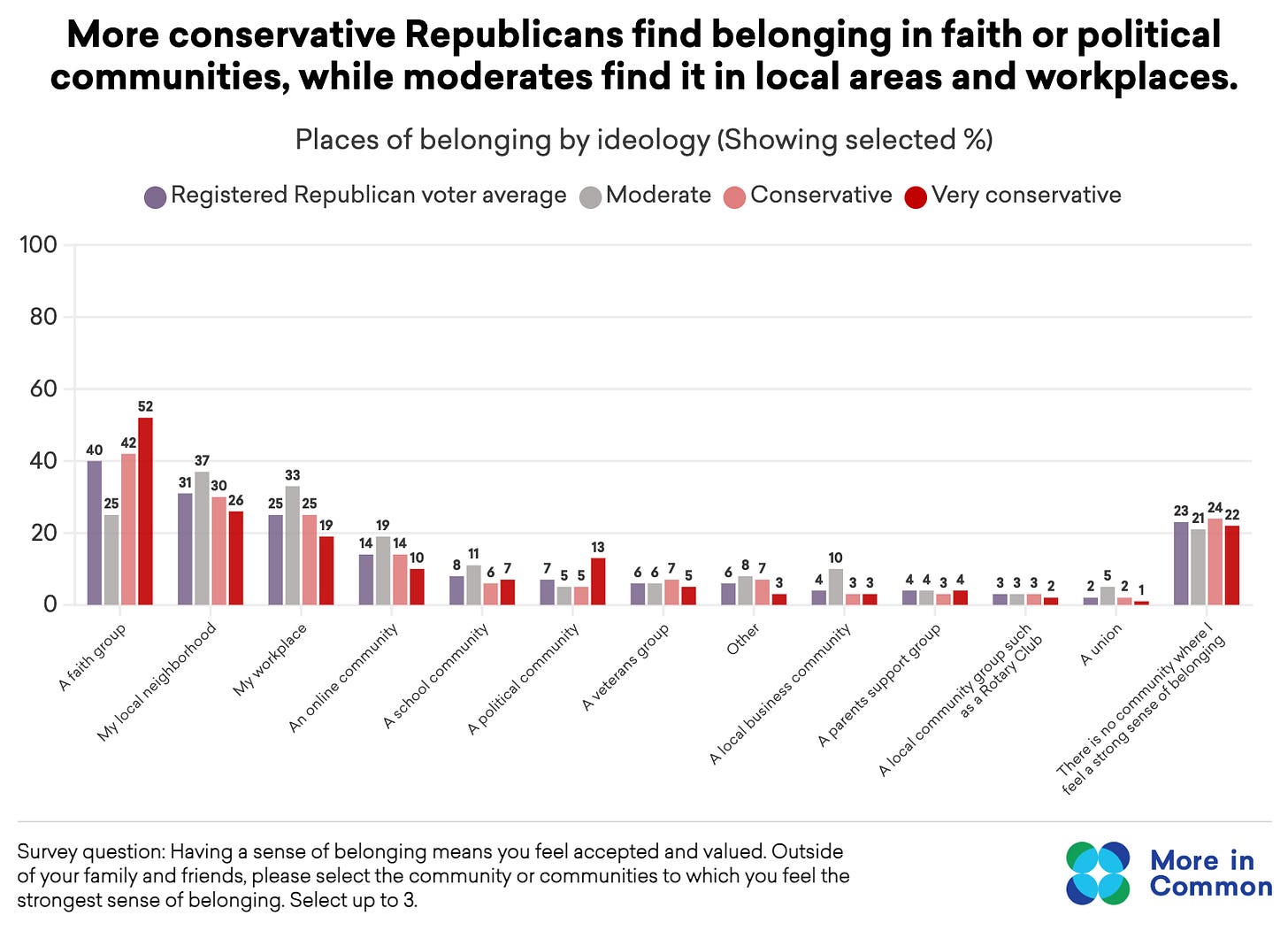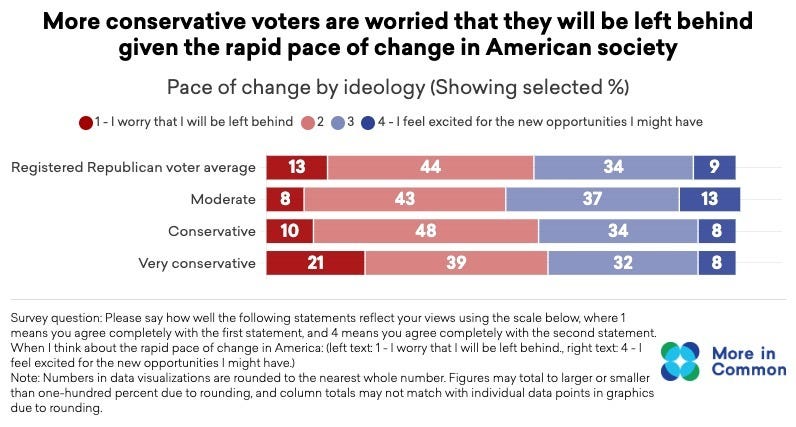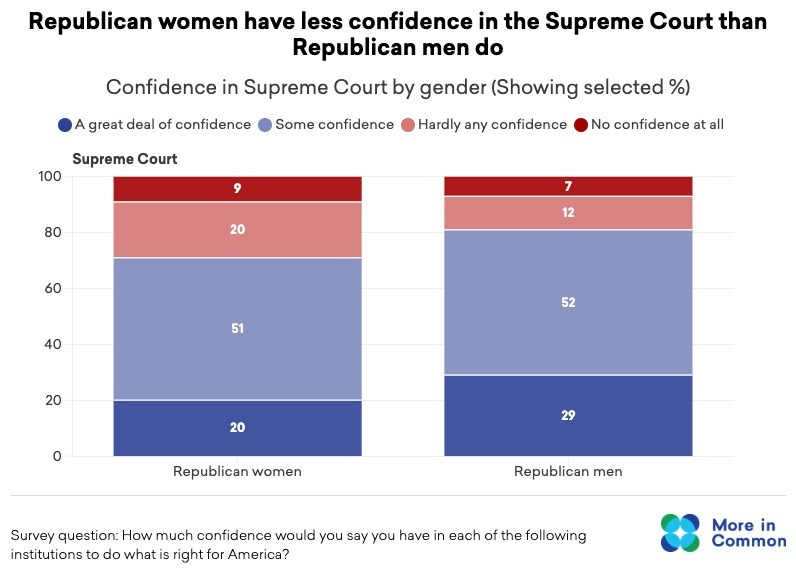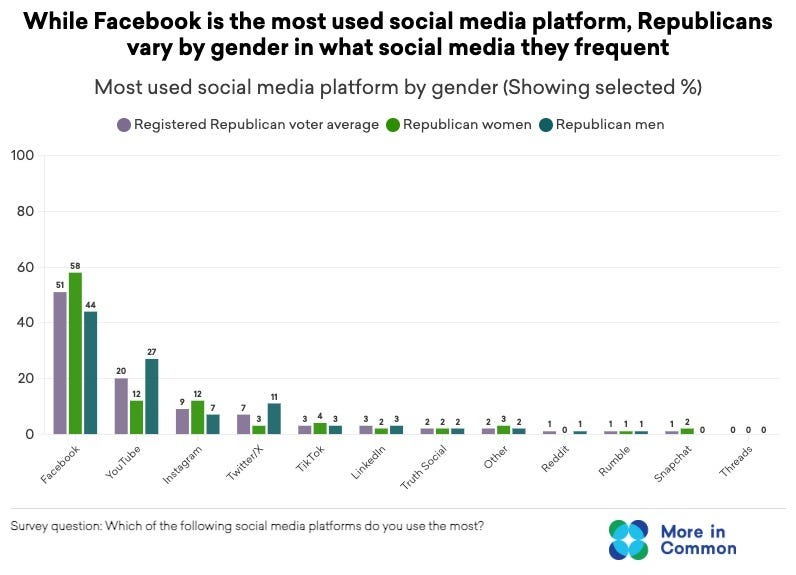Beyond Candidate Preferences: Differences Among Republican Voters by Ideology and Gender
Summary: As part of More in Common’s series, “Attitudes and Experiences of Republicans in America” we dive deeper into the Republican electorate through the release of a new report that focuses on differences based on voters’ ideology and gender.
In a political landscape oversimplified by media outlets categorizing voters on their allegiances to specific candidates, More in Common expands on its initial report and exploration into Attitudes and Experiences of Republicans in America through the release of Part Two in this series. Building off insights from our August survey of 800 registered Republican voters, our latest report highlights the nuances in beliefs, attitudes, and behaviors of Republicans by their self-reported ideology (moderate, conservative, and very conservative) and gender.
Here are some of the highlights:
Conservatism and Identity
While all 800 of our respondents are registered Republican voters, they did not all share the same ideology: 21% of our respondents identify as moderate, 45% identify as conservative, and 30% identify as very conservative (4% identify as liberal or not sure). Depending on a respondent's ideology, we found variations in the spaces where they feel belonging, the importance of their multi-faceted identities, and their feelings of the future.
Key Findings:
Spaces of Belonging: Moderate Republicans are more likely to say their workplace (33%) and local neighborhood (37%) is where they feel a sense of belonging. Very conservative Republicans stand out as more likely than other Republicans to say a political community is where they feel a sense of belonging (13% of “very conservative” Republicans compared to 5% of “moderate” or “conservative” voters).
Importance of Identities: Very conservative Republicans appear to have a stronger attachment to their group identities than less conservative Republicans. For example, more than half of very conservative Republicans say identities such as being American (72%), family role (63%), gender (60%), and religion (52%) are very important. Comparatively, one’s family role is the only identity that over half of moderates (52%) say is “very important” to their identity.
Optimism about the Future: More conservative voters have less optimism about the future and are more likely to be worried they will be left behind given the rapid pace of change in the US.
What Differentiates Republican Women from Republican Men
As research across various disciplines has shown, American men and women are different in many aspects. Some of these trends, such as that women tend to be more religious than men, we also find in our analysis of Republican men and women. We also find differences in attitudes towards the Supreme Court and social media behavior. By elevating these nuances, we can better understand what may be shaping voting preferences for Republican men and women voters.
Key Findings:
Spaces of Belonging: Republican women, while similarly conservative to Republican men, tend to be more religious and are more likely to have a sense of belonging within a faith group. For example, 46% of Republican women say a faith group is where they have a sense of belonging, compared to only 35% of Republican men.
Abortion and the Supreme Court: Republican men and women are similarly split about how much candidates should focus on abortion; however, Republican women are less confident in the Supreme Court than men.
We also find that Republican women’s confidence in the Supreme Court may have a relationship to how much they think presidential candidates should focus on abortion. For example, Republican women who want candidates to focus less on abortion are less confident in the Supreme Court than Republican women who want candidates to focus more or the same amount on abortion. This relationship does not hold true for men.
Social Media Usage: Republican men and women also vary in what social media platforms they use the most and how much they use them. While Facebook is the most popular platform for both Republican men and women, other platform usage varies greatly by gender.
Conclusion
As the 2024 Republican primary kicks off, polling and political commentary are naturally focused on exploring which candidates Republican voters support. There is an obvious and important logic to this approach—knowing which candidate people support is a good predictor of how people will vote. It is expected for any organization interested in political outcomes in America to track and influence which candidates gain support among various segments of the population. Yet, as our research shows, the Republican electorate is not homogenous. By going beyond candidate preferences or political labels, we can uncover greater nuance in the experiences, values, and beliefs that shape the American electorate.
For a deeper look, check out the links below as part of our “Attitudes and Experiences of Republicans in America.”
Note: Numbers in data visualizations are rounded to the nearest whole number. Figures may total to larger or smaller than one-hundred percent due to rounding, and column totals may not match with individual data points in graphics due to rounding.
Methodology: More in Common partnered with international polling company YouGov to conduct online survey interviews with N = 800 registered Republican voters from August 8-14, 2023. The respondents were matched to a sampling frame on gender, age, race, and education. The frame was constructed by stratified sampling of a subset of Republican registered voters in the 2022 Cooperative Election Study (CES) sample with selection within strata by weighted sampling with replacements (using the person weights on the public use file). The margin of error (adjusted for weighting) is +/- 3.7 for registered Republican voters and higher for subgroups.
Note: Numbers in data visualizations are rounded to the nearest whole number. Figures may total to larger or smaller than one-hundred percent due to rounding, and column totals may not match with individual data points in graphics due to rounding.
Sign Up For Our Report Webinar
Did you know: almost half of college students reported being afraid to express their opinions out of fear of offending their peers? With intensifying conflicts over free speech on campus, this data is especially critical to understand. Hear from research leads of our recent report, Free Speech and Inclusion: How College Students Are Navigating Shifting Speech Norms, as they discuss the significance of the findings and implications for higher education institutions.
When: November 9, 2023 at 2:30 p.m. (EST)







